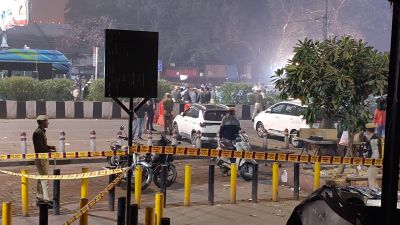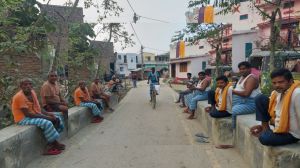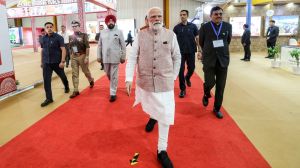India and US: a new maturity?
American shuttle diplomacy in South Asia is based on two assessments shared by its important allies. One, though the prospect of an imminent...

American shuttle diplomacy in South Asia is based on two assessments shared by its important allies. One, though the prospect of an imminent military conflict between India and Pakistan has receded, India-Pakistan tensions remain a matter of high priority concern; and two, to keep the lid on these tensions, diplomatic and political pressure should continue to be exerted on Pakistan and India, and particularly on India, because its restraint is reaching the limits of its tolerance threshold.
There is a more recent context as well to the latest visit by US Deputy Secretary of State Richard Armitage to Asia in August. The management of the situation in Afghanistan, which involves a fair amount of cooperation between India and the US, is descending into a pattern of uncertainty with the Karzai government remaining isolated in the ethnic and regional cross-currents of Afghan politics. The intensity of the anti-terror campaign in Afghanistan is abating. Even the anti-Taliban and anti-Al Qaeda campaign in the North-western areas of Pakistan is tapering off. The focus of US attention has now shifted to the preparations for ousting Saddam Hussain. Despite the importance India attaches to cooperation with the US in countering terrorism, it is opposed to a military campaign against Iraq, particularly a unilateral one led by the US.
Calibrating relations with India and Pakistan has become somewhat problematic for the US because of Musharraf’s policy stances and India’s responses during the last three weeks. The level of intrusions from the Pakistani side of the Line of Control remains at a dangerous high. Even more critical is the systematic campaign of assassinations being carried out against political figures who have indicated a willingness to participate in the elections in September. General Musharraf did not help matters by announcing his judgement that elections in J&K will be a farce in his address to the nation on Pakistan’s Independence Day. While India continues to be responsive to suggestions from the US about restraint vis-a-vis Pakistan, it remains firm on not resuming dialogue unless there is evidence of Pakistan withdrawing support to terrorist activities.
US Secretary of State Colin Powell indicated the lines on which the US plans to deal with the dilemma of sustaining its close relationship with Pakistan and consolidating positive trends in Indo-US relations. During his last visit to the sub-continent, he announced the ingredients of the US policy: the US thinks the government of Pakistan has taken steps to curb terrorist infiltration into India but it could do more (but he did not acknowledge any direct linkage between the government of Pakistan and anti-India terrorist activities); Kashmir is on the international agenda; the US welcomes elections in J&K as the first step towards a long-term solution; it desires that India and Pakistan resume direct dialogue.
There are other issues on which a divergence of opinion has emerged between India and the US. Though India supported US President Bush’s decision on the National Missile Defence project, it is not entirely happy about the US’s withdrawal from the Anti-Ballistic Missile Treaty. India has reservations about the US pulling back from the Kyoto Convention on Environment Management. President Bush’s decision not to participate in the Johannesburg summit and India’s differences of opinion with US policy on environmental issues since the summit at Rio in 1992 underline the differences on this issue. India also harbours reservations regarding US refusal to participate in fully implementing the WTO arrangements finalised in 1996 which will impact on Indian exports to the US.
While differences of opinion on specific issues are not unexpected, and they are being dealt with through the normal diplomatic means, it is at the deeper level of public perceptions in India and the US that Indo-US relations are entering a somewhat critical phase. There is a general disappointment and rising criticism in India about the US not being sensitive and supportive about Indian concerns regarding Pakistan. There is angst that despite India’s continuing endeavour to establish close rapport with the US since the early 1990s, the US response has not been as reciprocal as India hoped for.
|
Calibrating relations with India and Pakistan has become problematic for the US due to Musharraf’s policy stances and India’s responses in the last three weeks |
India’s new Foreign Secretary’s speech at the Federation of Indian Industries in July articulated this disappointment which was noted by Armitage who enquired about its implications in a discussion with the Indian ambassador in Washington. The Indian ambassador’s response was that there is no shift in India’s policy and that Sibal’s remarks are only a reflection of trends in public opinion in India.
As far as the specifics of Armitage’s discussions in Delhi are concerned, Indian interlocutors, particularly National Security Adviser Brajesh Mishra, clearly conveyed India’s disappointments with the US for not taking a firm stance against Pakistan’s subversive approach in J&K. He was told that Indian restraint should not be taken for granted if Pakistan sponsored violence disrupts the political processes in J&K. In response, Armitage stoutly maintained that Musharraf is committed to fulfilling his promises to the US about withdrawing support to terrorist activities in India. Secondly, he said he would again urge Musharraf to speed up the fulfilment of his promises. Both L.K. Advani and Brajesh Mishra have publicly stated that while attaching importance to India-US relations, India is clear it would have to deal with Pakistan without depending on support from the US.
Armitage’s visit was also in preparation for Prime Minister Vajpayee’s forthcoming meeting with President Bush in New York in September on the margins of the United Nations General Assembly session. The substance and atmospherics of the Armitage visit have served the purpose of nudging both governments to undertake a reality check on Indo-US relations. India should ensure that this emerging realism adds maturity to the consolidation of Indo-US relations. This process should not be disrupted by the dips and turns in Indian public opinion.



- 0112 hours ago
- 022 hours ago
- 0312 hours ago
- 0412 hours ago
- 052 hours ago




























